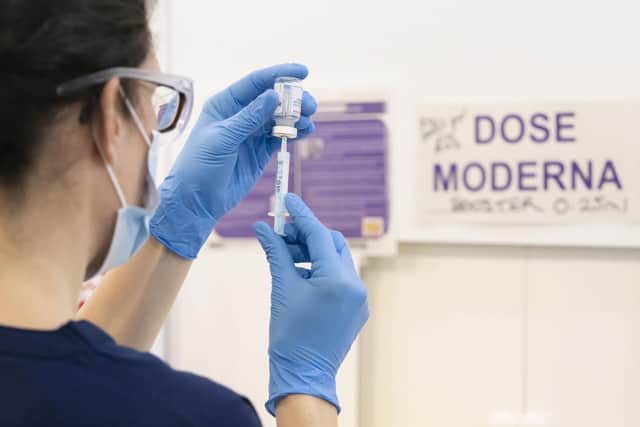Long Covid Leeds: Signs, symptoms and diagnosis as nearly 200,000 report living with it in Yorkshire
and live on Freeview channel 276
Across the UK, the number of people reporting that they have Long Covid has grown to two million.
In Yorkshire, an estimated 194,000 people reported experiencing long-lasting effects of Covid-19 infection in the four weeks to May 1, figures released by the Office for National Statistics show.


Advertisement
Hide AdAdvertisement
Hide AdIt represents 3.7 per cent of the population of the region and is a higher rate than the current UK average of 3.1 per cent.
Many of the people with Long Covid in Yorkshire said they had been living with it for some time.
An estimated 87,000 people - 45 per cent - of those with Long Covid, were first infected with Covid-19 at least a year before.
What are the symptoms of Long Covid?
Typical symptoms of coronavirus include a cough, high temperature or loss of taste or smell, but these usually don’t last more than three weeks.
Advertisement
Hide AdAdvertisement
Hide AdThe long-term symptoms that some people experience often vary widely and encompass both physical and neurological effects, with these lasting into weeks and even months in some cases.
The most common symptom of Long Covid is severe fatigue, while other sufferers have reported breathlessness, a persistent cough, joint pain, muscle aches and mental health problems.
The symptoms include:
Muscle aches and weakness
Severe fatigue
Breathlessness
Chest pain
Headaches
Joint pain
Skin rashes
Memory loss or lack of concentration
Depression
Anxiety
Struggling to think clearly
Digestive problems
Loss of taste and smell
Hearing and eyesight problems
Persistent cough
Hair loss
Why is the virus causing long-term effects?
It is believed that while the virus may have been cleared from most of the body, it can continue to linger in some small pockets which can cause longer-lasting symptoms.
As the virus can directly infect a wide variety of cells in the body, it can trigger an overactive immune system which causes damage throughout the body.
Advertisement
Hide AdAdvertisement
Hide AdIt is thought that the immune system does not return to normal after infection and this can cause damage to how the body’s organs function, such as if the lungs become scarred. This has been seen after Sars or Mers infections, which are both types of coronavirus.
Are some people more at risk of Long Covid than others?
Developing long-term symptoms does not appear to be linked to how ill you are when you are first infected with Covid-19, but new research has identified four key factors that could increase your risk.
A recent study published in the medical journal Cell identified four common factors that can be seen in the early stages of coronavirus infections.
Researchers said these factors are often found in people who later develop long-lasting symptoms, even if the infection was mild.
Advertisement
Hide AdAdvertisement
Hide AdThe four factors thought to increase the likelihood of developing Long Covid are:
the viral load in a person’s blood
the presence of certain autoantibodies (antibodies that recognise parts of our own body) which are often used to combat the virus and its symptoms
the reactivation of the Epstein-Barr virus, which has been known to infect people at a young age
if the patient has Type 2 diabetes
Is there a test for Long Covid?
Those suffering with long-lasting symptoms after Covid-19 infection should seek advice from a GP to discuss what impact it is having on your day-to-day life
Advertisement
Hide AdAdvertisement
Hide AdYour doctor may suggest some tests to find out more about your symptoms and rule out other things that could be causing them.
These might include:
blood tests
checking your blood pressure and heart rate
a chest X-ray
You may then be given advice about how to manage and monitor your symptoms at home, or referred to a specialist rehabilitation service or a service that specialises in the specific symptoms you have.
More information on recovery from Covid-19 can be found on the NHS Your COVID Recovery website.
